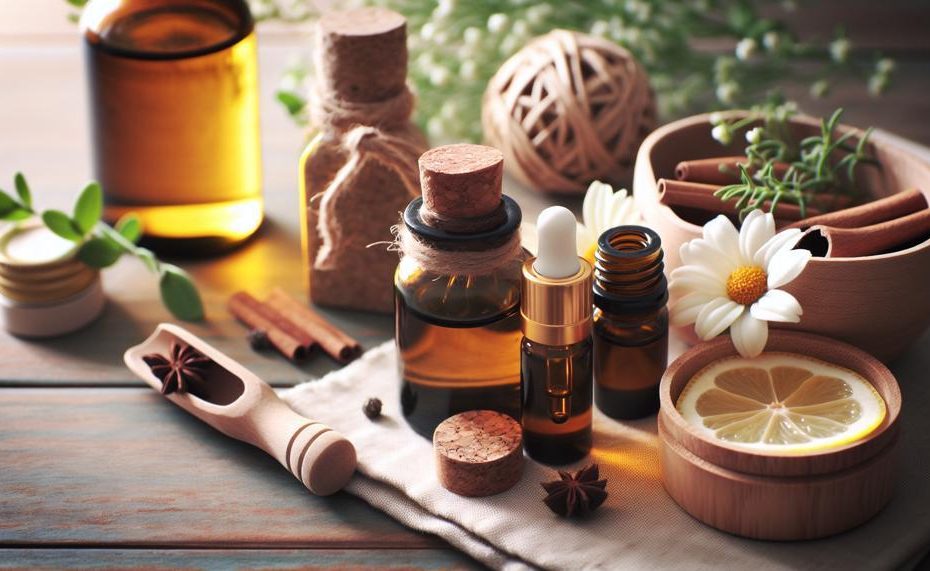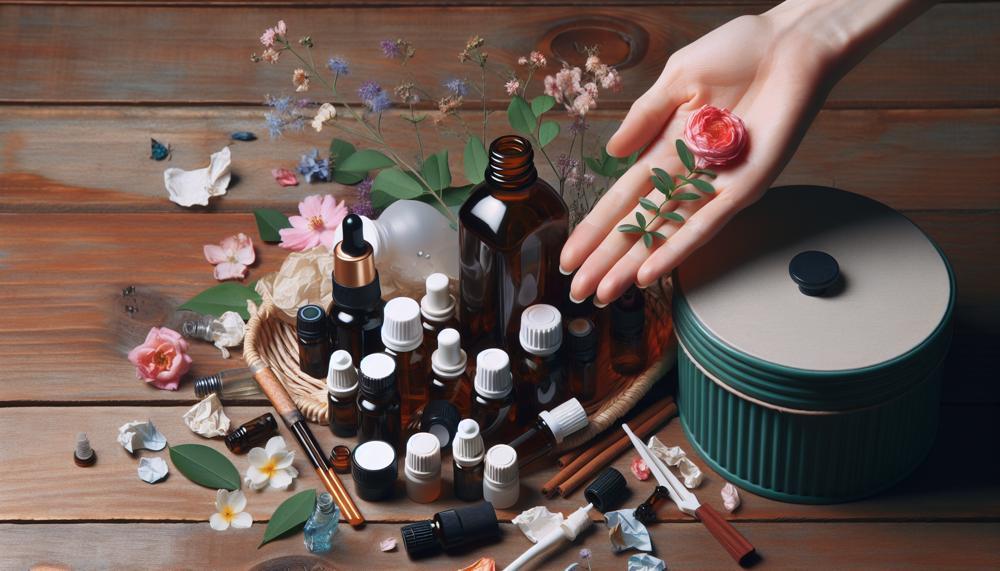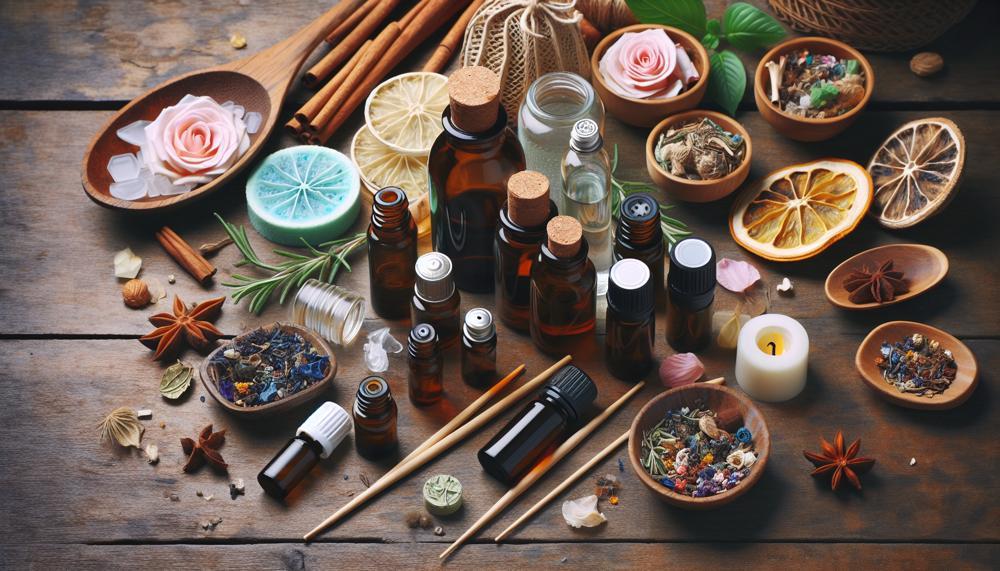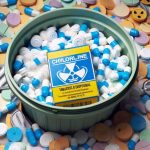Do you love indulging in the soothing scents of essential oils? These potent extracts have become a staple in many households for their therapeutic properties. But before you bask in their aromatic bliss, it’s crucial to understand the importance of safely disposing of these powerful substances.
Proper disposal of essential oils is not only necessary for environmental preservation but also for your safety. Here are some key guidelines to keep in mind when it comes to disposing of essential oils:
- Never pour essential oils down the drain or flush them down the toilet. These concentrated liquids can cause damage to your plumbing system and harm aquatic life.
- Instead, consider recycling your empty essential oil bottles. Many local recycling programs now accept glass bottles, so be sure to check with your city or town.
- If recycling is not an option, dilute the remaining oil with a carrier oil (such as coconut or almond oil) and pour it into a sealed container before throwing it away.
- Properly label all containers to avoid confusion and potential accidents in the future.
- For larger quantities of essential oils, contact your local hazardous waste facility for proper disposal methods.
By following these simple yet crucial steps, you can ensure that you are safely disposing of your essential oils while also being environmentally responsible.
So, next time you reach for that bottle of calming lavender oil, remember to also think about its proper disposal – because taking care of yourself should never come at the expense of our planet’s well-being.
Contents
- 1 How do I properly dispose of essential oils?
- 2 Can you pour essential oils down the drain?
- 3 How do you know your essential oils have surpassed their shelf life?
- 4 How to reuse essential oils
- 5 Are essential oil bottles recyclable?
- 6 What can you do with empty essential oil bottles?
- 7 Take care of your essential oils
- 8 Conclusion
How do I properly dispose of essential oils?
When it comes to properly disposing of essential oils, there are multiple recommended methods that you can choose from depending on the type of oil and your local regulations.
These methods include giving away or reusing the oil, mixing it with other materials, and allowing it to safely evaporate.
Below is a table summarizing these methods and their benefits:
| Method | Description | Benefits |
| Giveaway or Reuse | The best option for expired but still usable oils is to give them away to friends, family, or local community groups. Alternatively, you can reuse them by mixing them with carrier oils or creating new blends. | – Reduces waste and promotes sustainability – Gives others a chance to enjoy the benefits of essential oils – Saves money by not having to purchase new oils |
| Mix with Sand or Soil | Mixing essential oils with sand or soil helps to dilute the oil and make it less potent. This method is ideal for larger quantities of unused oils. | – Makes the oil safer for disposal – Prevents harm to the environment and wildlife |
| Soak up with Absorbent Material | Absorbent materials such as paper towels, cloth, or cotton balls can be used to soak up small spills or unused oils. These materials can then be disposed of in the trash. | – Easy and convenient – Helps prevent accidental spills or contamination – Prevents harm to the environment |
| Dispose in the Garden | Old essential oils can be safely disposed in the garden by mixing them with baking soda and watering them into the soil. This method is ideal for oils that are safe for topical use and not toxic to plants. | – Natural and environmentally-friendly – Promotes plant growth and health |
| Use Cat Litter | Another option for disposing of old oils is to mix them with cat litter, which helps to absorb the oil. The mixture can then be disposed of in the trash. | – Easy and convenient – Helps absorb and neutralize the oil – Prevents harm to the environment |
| Let Evaporate in a Safe Dish | Small amounts of unused essential oils can be safely left to evaporate in a dish, away from heat sources or open flames. This method can take a few days, but it is effective. |
Can you pour essential oils down the drain?
No, it is not safe to do so. Essential oils are highly concentrated and can cause significant damage to water pipes and the environment. It is crucial to follow proper disposal methods to prevent any harm.
| Method | Description | Advantages |
| Evaporation | Leave oils in an open container to naturally evaporate. | – Reduces waste
|
| Cat Litter | Mix oils with cat litter and dispose of in the trash. | – Absorbs oils and prevents spills
|
| Waste Management Department | Contact your local waste management department for proper disposal instructions. | – Ensures proper disposal
|
| Composting | Add oils to a compost pile and use as natural fertilizer. | – Promotes sustainability
|
| Baking Soda | Mix oils with baking soda and dispose of in the trash. | – Absorbs oils and prevents spills
|
| Garden Disposal | Dig a hole in your garden and dispose of oils safely. | – Safe for the environment
|
| Reuse Oils | Categorize oils based on their properties and reuse for various purposes. | – Reduces waste
|
To safely reuse essential oils, here are some steps you can follow:
Categorize oils based on their properties, such as citrus, floral, woody, or herbal.
Utilize oils for different purposes, such as diffusing in water for cleaning or as natural insect repellants.
Purchase oils from companies with high turnover rates to ensure freshness.
Store oils in cool places to prevent oxidation.
Proper disposal of essential oils not only prevents harm to the environment and potential fire hazards, but it also promotes sustainability and reduces waste. It is crucial to follow these methods and take necessary precautions when handling and disposing of essential oils.
In addition to these methods, there are other strategies you can use to reduce waste and promote sustainability when using essential oils.
How do you know your essential oils have surpassed their shelf life?
Essential oils are potent extracts from plants that have a limited shelf life. Knowing when your essential oils have gone bad is crucial to ensure safe and effective use. Below are some ways to determine if your essential oils have surpassed their shelf life:
- Check the purchase date: Essential oils, like any other product, have an expiration date. Check the date of purchase or inquire about the company’s stock rotation policy to determine when the oil was produced.
- Observe signs of oxidation: When exposed to oxygen, essential oils can oxidize and lose their potency. Look for changes in color, consistency, or smell.
- Note changes in texture: Over time, essential oils may become thicker or thinner, indicating spoilage.
- Watch for skin irritation: Expired essential oils can cause skin irritation when applied topically. If you experience redness, itching, or burning after use, it may be time to replace the oil.
- Notice changes in scent: Essential oils may lose their distinct aroma when they expire. If the scent has significantly changed, it may be time to discard the oil.
To get a better understanding of essential oil shelf life, here is a table showing the recommended shelf life of commonly used oils:
| Essential Oil | Recommended Shelf Life |
| Lemon | 1 year |
| Lavender | 2 years |
| Peppermint | 3 years |
| Eucalyptus | 4 years |
| Tea Tree | 5 years |
| Sandalwood | 6 years |
| Patchouli | 7+ years |
Note that these are only recommendations and essential oils may expire sooner or last longer based on storage conditions and quality.
How to reuse essential oils
Using essential oils can be a safe and effective way to save money by reusing them in different ways. However, it’s crucial to prioritize safety when doing so. Here are some tips to help you safely reuse essential oils:
- Dilute the oils: For those with sensitive skin or allergies, diluting essential oils with a carrier oil like coconut or almond oil can reduce the risk of adverse reactions. This is especially important for oils that are known to cause skin irritation.
- Diffuse with caution: Essential oil diffusers are an excellent way to reuse oils, but it’s essential to follow the manufacturer’s instructions and not use too many drops, which could lead to an overwhelming scent or respiratory irritation.
- Make your own cleaning products: Essential oils have natural antibacterial and antiviral properties, making them a perfect addition to homemade cleaning products. However, always conduct a patch test before using any product containing essential oils on a larger surface.
- DIY beauty products: When used correctly, essential oils can provide numerous benefits for the skin and hair. From facial serums to hair masks, there are plenty of ways to incorporate essential oils into your beauty routine. Just remember to research recommended dilution rates and do a patch test before using them.
- Aromatherapy: The scents of essential oils can promote relaxation and overall well-being in aromatherapy. You can add a few drops of oil to a warm bath, use them in massage oil, or inhale them directly from the bottle. But always use essential oils in moderation and avoid prolonged exposure.
Remember, safety should always come first when reusing essential oils. Follow proper disposal methods and consult local regulations before disposing of them.
Are essential oil bottles recyclable?
Although it may seem like a small contribution, recycling essential oil bottles is an important step towards a more sustainable environment. It is crucial to understand the material of each bottle and its packaging to guarantee proper disposal. Here are some useful tips for recycling essential oil bottles:
- Check the bottle’s material: Essential oil bottles are typically made of either glass or plastic. Glass bottles can easily be recycled by melting them down and reusing the material. However, plastic bottles have different recycling codes depending on the type of plastic used. To determine the type, check the bottom of the bottle for a recycling symbol with a number.
- Thoroughly clean the bottle: Before recycling, it is essential to get rid of any remaining oil from the bottle. This can be done by rinsing it with warm water and soap or using a natural solvent such as white vinegar. By doing this, we prevent any potential contamination during the recycling process.
- Remove labels and lids: Most labels and lids on essential oil bottles are not recyclable, so it is important to remove them before recycling the bottle. A solvent like rubbing alcohol can be used to remove any sticky residue left behind by the labels.
- Recycle or repurpose: Once your essential oil bottles are clean and free of labels and lids, recycle them according to your local guidelines. Alternatively, you can also repurpose them for various uses, such as storing homemade cleaning products or creating your own essential oil blends.
Take a look at this table to compare the recyclability of glass and plastic essential oil bottles:
| Material | Recyclable? |
| Glass | Yes |
| Plastic #1 (PET) | Yes |
| Plastic #2 (HDPE) | Yes |
| Plastic #3 (PVC) | No |
| Plastic #4 (LDPE) | Yes |
| Plastic #5 (PP) | Yes |
| Plastic #6 (PS) | Yes |
| Plastic #7 (Other) | Depends on local recycling guidelines |
What can you do with empty essential oil bottles?
Recycling empty essential oil bottles may seem like a simple task, but it’s important to properly prepare them before recycling. While some local recycling facilities may accept all types of essential oil bottles, others may only accept certain materials.
To ensure your bottles can be recycled, check the material and packaging of each bottle. Generally, glass or plastic bottles can be recycled, while metal or mixed material bottles may not be accepted.
Before tossing your empty essential oil bottles into the recycling bin, make sure to remove any remaining oil and labels. This is crucial to prevent contamination and ensure that the bottles can be properly recycled.
But what if your local recycling center doesn’t accept essential oil bottles? Don’t worry, there are still ways to repurpose or upcycle them instead of throwing them away.
One option is to reach out to waste management centers for information on their bottle return programs. Many brands and retailers also offer bottle return programs where you can drop off your empty bottles for proper recycling.
Another option is to donate your empty bottles to art programs where they can be used for creative projects.
To reduce waste and promote sustainability in the long run, consider choosing eco-friendly packaging options for essential oils. Refillable or bulk containers from sustainable brands are great alternatives to single-use essential oil bottles.
Take care of your essential oils
To properly preserve and handle essential oils, it is crucial to store them in a cool and dimly lit location, utilize dark-coloured glass bottles, tightly seal the containers, avoid exposing them to water, clearly label each bottle, keep them out of reach of children and pets, dilute with a carrier oil, and keep them away from open flames.
These precautions are essential for maintaining the potency and effectiveness of the oils, preventing contamination, and ensuring safe use.
Additionally, choosing environmentally-friendly packaging options and properly disposing of or repurposing empty bottles can also promote sustainability and minimize waste.
Always consult a certified aromatherapist or conduct thorough research before using essential oils for any purpose.
Conclusion
In conclusion, the use of essential oils can bring a sense of serenity and relaxation to our lives.
However, it is crucial to also consider the safe disposal of these potent substances. Not only does proper disposal protect the environment, but it also ensures the safety of ourselves and those around us.
It is important to remember that pouring oils down the drain or flushing them down the toilet can have harmful consequences. Instead, opt for recycling or diluting with a carrier oil before disposing of them properly.
Labeling containers and contacting hazardous waste facilities for larger quantities is also essential in ensuring responsible disposal.
Additionally, old oils can be repurposed and reused in various ways to promote sustainability and reduce waste.







